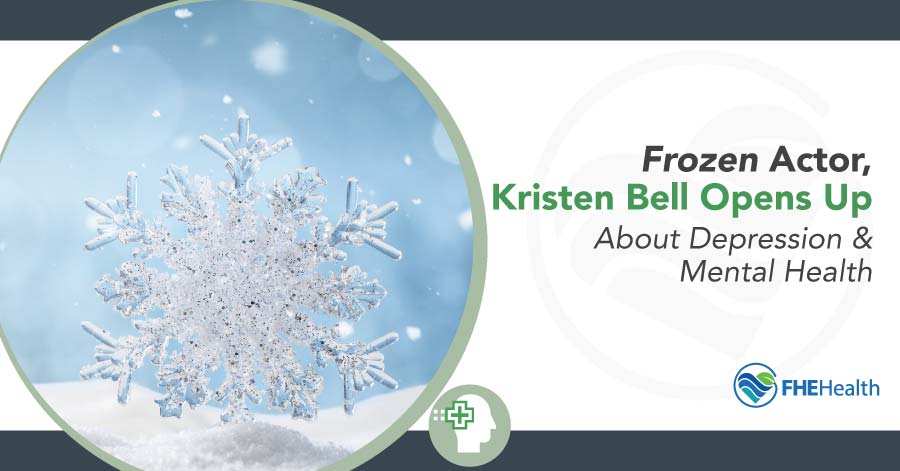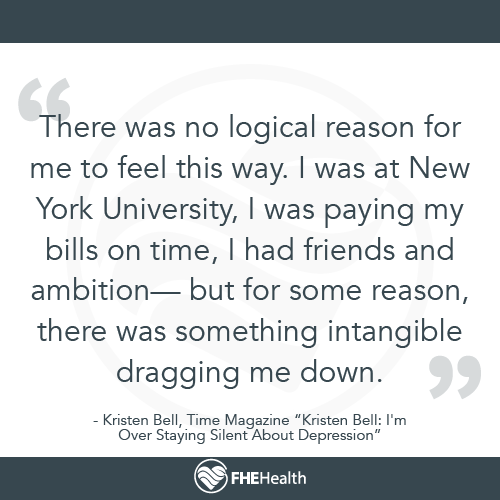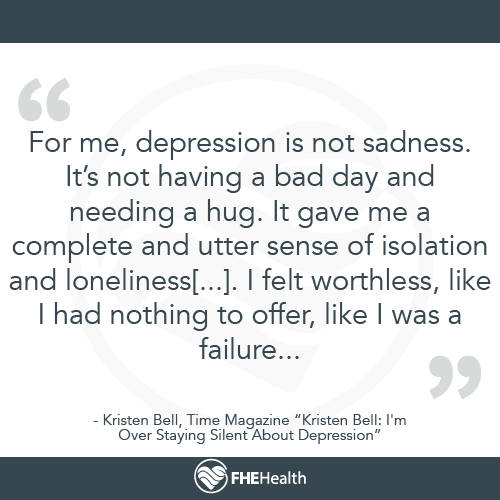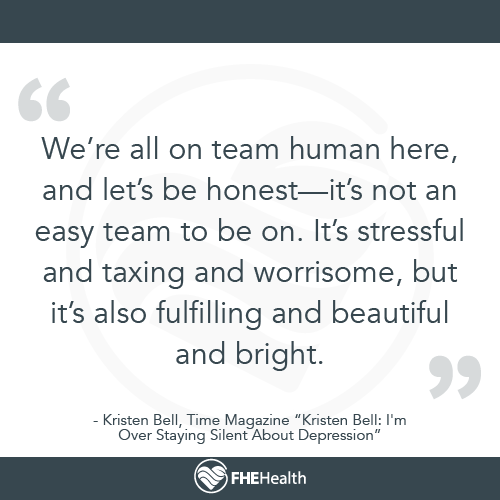
“There was no logical reason for me to feel this way. I was at New York University, I was paying my bills on time, I had friends and ambition— but for some reason, there was something intangible dragging me down.” —Kristen Bell on her first experience with depression
If you’re a fan of Disney’s Frozen, you may be familiar with the character of Anna played by Actress Kristen Bell. Bright, positive, optimistic, Anna exemplifies the film’s feeling of hope. Yet, Bell, who gave such poignant voice to this now-iconic character, has not been a stranger to hopelessness. In recent years, the actress has come out publicly to discuss her long-time struggles with anxiety and depression. Bell, who comes from a line of women who have a serotonin imbalance, illustrates that mental health can affect anyone. Even with her fame, wealth, and beauty, Bell is not immune from mental health disturbance. By revealing her struggles, she hopes to reduce the stigma surrounding mental illness and inspire others to get help.
Kristen Bell’s History and Career
 Before there was Frozen, there was Bell’s life, growing up in a suburb of Detroit, a child of divorce, but an enthusiastic kid with friends and a love for singing and school. At age eleven, Bell became a vegetarian, demonstrating an early love for taking on causes (care of animals) that were important to her. In high school, Bell took to musical theatre, performing in productions of “The Wizard of Oz” as Dorothy Gale and in “Fiddler on the Roof.” After graduating, Bell decided to attend the Tisch School of the Arts at New York University where she majored in musical theater.
Before there was Frozen, there was Bell’s life, growing up in a suburb of Detroit, a child of divorce, but an enthusiastic kid with friends and a love for singing and school. At age eleven, Bell became a vegetarian, demonstrating an early love for taking on causes (care of animals) that were important to her. In high school, Bell took to musical theatre, performing in productions of “The Wizard of Oz” as Dorothy Gale and in “Fiddler on the Roof.” After graduating, Bell decided to attend the Tisch School of the Arts at New York University where she majored in musical theater.
Before graduating from Tisch, Bell left college to take the role as Becky Thatcher in the Broadway production of “The Adventures of Tom Sawyer.” From there, her career in acting and music took shape. In 2004, she won the lead role in the show “Veronica Mars.” She then began acting in films, including Forgetting Sarah Marshall, Couples Retreat, Burlesque, and Scream 4. In 2014, Bell hit superstardom as the voice of Frozen’s Anna and once again with the release of Frozen 2.
Bell’s voice has also been featured in video games like Disney Infinity and Astroboy as well as starring in ABC’s The Good Place. When she isn’t working, she’s spending time with her husband, actor Dax Shepherd, and her two daughters.
Kristen Bell Opens Up about Her Anxiety and Depression
 Bell has achieved considerable success in her career, but privately, Bell has experienced what she describes as a serotonin imbalance that triggers serious bouts of anxiety and depression. Bell isn’t alone. Her mother informed her at a young age that if she ever felt as if a dark cloud was following her, she could get help. Bell comes from a line of women who also have serotonin imbalance. Bell decided to open up about her depression and anxiety, knowing that as many as an “estimated 17.3 million adults in the United States had at least one major depressive episode” in a single year.
Bell has achieved considerable success in her career, but privately, Bell has experienced what she describes as a serotonin imbalance that triggers serious bouts of anxiety and depression. Bell isn’t alone. Her mother informed her at a young age that if she ever felt as if a dark cloud was following her, she could get help. Bell comes from a line of women who also have serotonin imbalance. Bell decided to open up about her depression and anxiety, knowing that as many as an “estimated 17.3 million adults in the United States had at least one major depressive episode” in a single year.
Bell has talked about her first experience with depression, which occurred when she was in college. In spite of her friends and ambitions, she felt an intangible sadness. Then she remembered what her mother had once told her: get help. Bell knew that letting her sadness fester would be unhealthy and could manifest in destructive behaviors. She took her feelings of worthlessness and failure to a therapist and got help putting her feelings in perspective— learning that they were shaped in the context of her depression.
By revealing her struggles, Bell wants others to know that they have options. As she said, “depression is a problem that actually has so many solutions.” And, she’s right. On-going counseling, medication, lifestyle and dietary changes, and other types of therapy can have a dramatic impact on the management of mental health conditions like anxiety and depression.
In a recent article, Bell discussed the solutions that she believes work best for her. Bell takes a “daily antidepressant (to help with “waves of serotonin imbalance,” she says), a daily dose of CBD oil and adaptogens, a form of herbal medicine,” according to USA Today. Bell is still a vegetarian and is mindful of her diet and how it impacts her health.
Ultimately, Bell wants her fans to know that even though she presents a bubbly, upbeat persona, she does a lot of work to make it so. She keeps up with therapy and her treatment regimen. She also wants others to know that when people are stigmatized for their depressive symptoms and their hopelessness, they are less likely to seek out professional help. It’s the taboos surrounding mental disorders and conditions that are so unhealthy and such a barrier to treatment. She hopes that her openness inspires others to talk or simply to get the help they need to feel better.
To further help people who might be suffering with depression or anxiety, Bell partnered with Women’s Health to create a “Mental Health Challenge.” The partnership resulted in a list of strategies—a sort of toolbox—that can help people when they’re feeling overwhelmed or even just out of sorts. Some of the strategies outlined in the Mental Health Challenge include:
- Performing an enjoyable physical activity
- Finding a way to restore energy when feeling drained
- Doing an activity that allows you to “live in the moment”
- Developing coping methods for dealing with annoyance
- Doing something that allows you to feel strong
These tips might help individuals who are facing periods of anxiety or depression. Of course, if these strategies don’t alleviate your symptoms, it’s important to seek out help from your healthcare provider or a clinic that specializes in mental health.
The Importance of Sharing Her Experience
 Bell hopes that her experience and positive attitude about encouraging others can have a strong impact on others. It is tremendously helpful when a person in the spotlight, a person who seems to “have it all” is willing to discuss their private issues with mental health or conditions like substance addiction. Bell wants others to know that anyone can be affected by mental illness regardless of their status, their wealth, or their career. In other words, it’s not a choice. But it is a choice to seek help.
Bell hopes that her experience and positive attitude about encouraging others can have a strong impact on others. It is tremendously helpful when a person in the spotlight, a person who seems to “have it all” is willing to discuss their private issues with mental health or conditions like substance addiction. Bell wants others to know that anyone can be affected by mental illness regardless of their status, their wealth, or their career. In other words, it’s not a choice. But it is a choice to seek help.
In Time Magazine, Bell stated, “It’s important for me to be candid about this so people in a similar situation can realize that they are not worthless and that they do have something to offer. We all do.” She added that she believes that she is on “team human,” and that we all are on this team. She discussed her feelings of social responsibility and how they compelled her to open up about her anxiety and depression. Being on this team is “stressful and taxing and worrisome, but it’s also fulfilling and beautiful and bright,” she said. It’s her belief that communication is one of the keys to combatting mental health conditions and their stigmas. As she said, “Let’s work together to find those solutions for each other and cast some light on a dark situation.”






